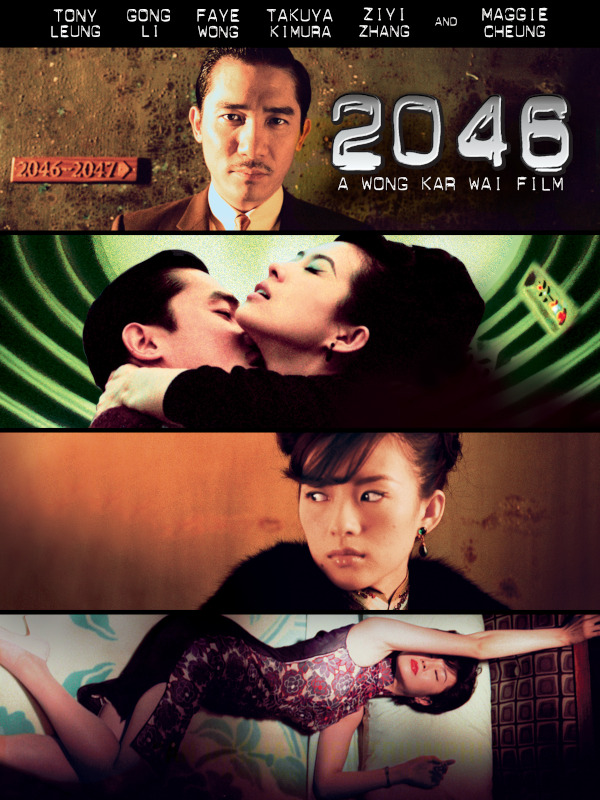- Title: 2046
- IMDb: link

2046, the latest from Kar Wai Wong, is a mysterious tale of love and loss. The film is a follow up to In the Mood For Love and although some of the same characters appear as in the first movie it really isn’t what you would describe as a sequel. What it turns out to be is a complex love story spanning years and distances, time and space, in the search for 2046.
What is 2046? It’s a time, it’s a place, it’s the title of a novel, it’s a state of mind, and it’s the number of a hotel room that houses a series of women who catch the attention of our protagonist who lives across the hall. 2046 is as much art as film and tells a winding, sometimes confusing but thoroughly enjoyable, story through times and memories, both real and imaginary.
Chow Mo Wan (Tony Leung Chiu Wai) is a newspaper man who leaves Singapore and his love Su Li Zhen (Li Gong) for Hong Kong for the chance of finding work. He asks for room 2046 in an apartment house because of the strong memory and connection from his past. Since the room is unavailable, the prostitute Lulu (Carina Lau) has just been brutally killed inside, he takes the room across the hall. From his apartment he watches and interacts with the different women who come to live in 2046 including the owner’s daughter Wang Jing Wen (Faye Wong) who is in love with a Japanese man (Takuya Kimura who also plays the Japanese version of Chow in his novel) despite her father’s strong objections, and Bai Ling (Ziyi Zang) a prostitute who begins an always sexual though rarely emotional relationship with Chow.
The story is inter-cut with scenes from Chow’s life in Singapore, including his memories of another Su Li Zhen (Maggie Cheung), and the scenes of the futuristic world of Chow’s novel 2046 where the women of the film live in Chow’s interpretation of their true selves and which is a time and place that can only be reached on a long train ride where people travel to recapture lost memories, lost opportunities, and lost love. Whether the futuristic scenes or the retro 1960’s scenes, or both, hold the truth to the movie is up to debate, but all are extremely well done.
It’s an odd movie to try to describe as the film is meant to be interpreted and enjoyed rather than understood. It’s metaphorical and abstract reality creates an intriguing setting for the unfolding of this complex tale.
The film is shot beautifully and the director knows how to use light, smoke, textured backgrounds and perspective for a vivid and tactile movie experience; it’s just outstanding filmmaking. The performances help create real characters from the half truths and shadows that they hide in for most of the film and breathe life and emotion into what could have been a very sterile world but which turns out to be both warm, inviting, strange and wonderful, intoxicating and infuriating, and very, very cool.
One aspect that might turn off some viewers – there is no English track for the film; it is only available in Cantonese with either English or Cantonese subtitles. The DVD contains a documentary with interviews with the cast and director (like the film, only subtitled in English), a small collection of deleted scenes and an alternate ending, interviews with the director and two of the film’s stars Leung and Zhang that discusses some of the unusual aspects to the making of this film, a documentary on the CGI of the film, musical extras, a poster gallery and an interesting look at the numerology of the film.
I’ve watched the film twice now and I’m not sure I’ve seen enough to tell you exactly what it is and what it means. I can tell you it’s definitely worth watching. Filled with a good collection of extras it’s a DVD that is worth adding to your collection. The film may be maddening to some but its subtle beauty and numerous layers offer the chance to enjoy and contemplate the film’s deeper meanings, something too few American films are able or willing to do.

